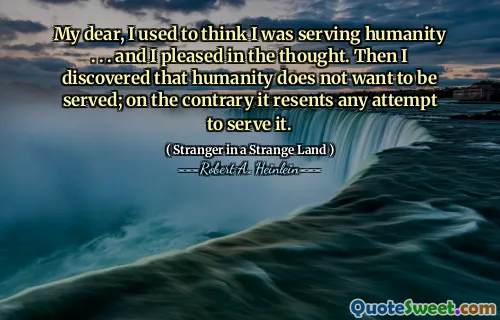
They insisted on thinking of God as something outside themselves. Something that yearns to take every indolent moron to His breast and comfort him. The notion that the effort has to be their own, and that the trouble they are in is all their own doing, is one that they can't or won't entertain.
This quote challenges a common perspective on spirituality and personal responsibility. It highlights how some individuals perceive the divine as an external entity, a comforting figure who takes away their burdens without requiring any internal effort or self-awareness. This externalization of God serves as a psychological safeguard, absolving oneself of accountability for their circumstances. The idea that God yearns to comfort lazy or indifferent individuals suggests a benign, forgiving deity who offers solace regardless of personal effort. However, the quote critically points out that this mindset leads to a refusal to accept personal responsibility for one's actions and current situation. When individuals believe that their troubles are merely due to external forces or divine neglect, they eliminate the need for self-reflection or change. This mindset can hinder growth, perpetuate complacency, and prevent individuals from confronting their own failings or shortcomings. It raises profound questions about the nature of faith and responsibility: Is faith merely about seeking external comfort, or does it also encompass acknowledging one’s role in shaping their destiny? Embracing accountability involves recognizing the power individuals have over their lives and understanding that true internal growth often requires effort and conscious action. By absolving themselves of responsibility, individuals risk remaining stagnant, disconnected from their capacity to evolve. The quote serves as a reminder that true strength lies in accepting one’s own contributions to their circumstances, and that spiritual or personal development is fueled by internal effort rather than external comfort alone.











